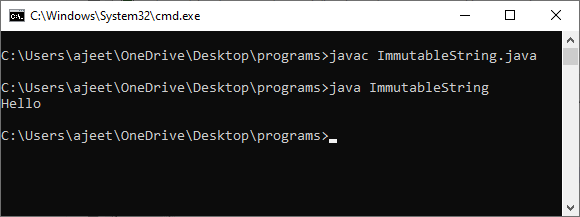Why Are Strings Immutable in Java? Safety And Security and Performance Advantages
Why Are Strings Immutable in Java? Safety And Security and Performance Advantages
Blog Article
Exploring the Advantages of Immutable Strings in Modern Shows Paradigms
In the realm of modern-day programming standards, the idea of immutable strings stands as a foundation of durable software application development. By adopting immutable strings, programmers can make sure boosted data honesty, improved thread safety, streamlined debugging processes, raised security procedures, and reliable efficiency optimization.
Improved Information Integrity

By protecting against the modification of string items, immutability eliminates the threat of unintentional adjustments to the information they hold. This not just improves the security of the information but likewise boosts the integrity of the code that depends on these strings.
Immutability also sustains more secure multithreading atmospheres, as concurrent accessibility to immutable strings does not position the danger of data corruption via simultaneous adjustments. This home streamlines the procedure of handling strings in identical shows scenarios.
In significance, immutability functions as a safety shield around the information stored within strings, improving their stability by ensuring that as soon as defined, their values continue to be unmodified throughout the program's execution.

Boosted String Safety
Immutable strings improve the thread security of programs by making sure that when a string things is produced, its value can not be customized. This residential property removes the risk of simultaneous strings attempting to change the very same string simultaneously, which might lead to data corruption or irregular states in the program - Why are strings immutable in Java?. In a multi-threaded atmosphere, where several threads access and adjust data at the same time, the immutability of strings offers a degree of safety by guaranteeing that the information continues to be unchanged throughout its lifecycle
Simplified Debugging Procedures
Offered the enhanced thread safety and security assisted in by immutable strings, a significant advantage arises in the world of simplified debugging processes. Immutable strings, when developed, can not be altered, making it easier to map the circulation of information and recognize the source of bugs in a program. This immutability guarantees that strings continue to be regular throughout the execution of the program, reducing the probability of unforeseen adjustments that might cause mistakes.
When debugging with mutable strings, developers commonly run into issues where a string's value is changed unintentionally, making it testing to pinpoint the root reason of an insect. Nevertheless, with unalterable strings, the data continues to be the same, allowing programmers to concentrate on analyzing the actual logic of the code instead of locating where and when a string was changed improperly.
Furthermore, unalterable strings simplify the debugging procedure by enabling less complicated recreation of bugs. Considering that immutable strings do not transform state, programmers can recreate and examine bugs much more efficiently, leading to quicker recognition and resolution of issues within the codebase. This structured debugging process eventually adds to greater software application quality and boosted total advancement effectiveness.

Enhanced Safety And Security Procedures
Enhancing data defense and strengthening system honesty, the use of unalterable strings in software program applications contributes dramatically to raised safety actions. Immutable strings, once created, can not be modified, providing her comment is here a crucial defense versus malicious tampering or unauthorized accessibility. By making certain that delicate data saved in strings stays unaltered throughout the program's implementation, the danger of data violations or shot assaults is substantially decreased. Why are strings immutable in Java?. Immutable strings likewise play an essential duty in stopping common safety and security vulnerabilities such as buffer overflows and SQL shot strikes, as attempts to adjust string information at runtime are inherently restricted.
Moreover, the immutability of strings boosts the predictability of program behavior, making it easier to validate inputs and protect against unanticipated changes that might endanger security. This predictability streamlines the process of auditing and validating code, making it possible for programmers to recognize prospective security loopholes better. On the whole, incorporating unalterable strings right into software program development practices not only boosts the robustness and reliability of applications but likewise reinforces their strength against safety and security risks.
Efficient Performance Optimization
When dealing with mutable strings, procedures like concatenation or substring development often result in the creation of brand-new string items, leading to memory expenses and boosted processing time. By permitting strings to stay stable and consistent, immutable strings promote much better memory administration and caching possibilities, eventually increasing the total performance of the software application.
Immutable strings likewise play an important role in multithreaded atmospheres by advertising thread safety and security. Why are strings immutable in Java?. Considering that immutable strings can not be changed as soon as created, they can be shared throughout threads without the danger of unanticipated adjustments, reducing the requirement for synchronization mechanisms and boosting concurrency. Furthermore, unalterable strings simplify debugging processes as designers can rely on that a string's worth will stay regular throughout the program's execution, getting rid of possible errors triggered by mutable state changes. In verdict, using unalterable strings not just improves safety and security but likewise significantly adds to the effective efficiency optimization of modern-day software application systems.
Final Thought
In verdict, the benefits of utilizing unalterable strings in modern shows standards can not be overemphasized. Enhanced data honesty, improved string safety, streamlined debugging procedures, boosted safety procedures, and reliable performance optimization all add to the total efficiency of programming tasks. By incorporating unalterable strings right into shows methods, developers can take advantage of a much more reputable and robust codebase.
Immutability, a crucial function of strings in shows languages such as Java and Python, ensures that as soon as our website a string things is developed, it can not be changed or modified.Unalterable strings improve read review the string safety and security of programs by making certain that as soon as a string things is developed, its value can not be customized. Immutable strings also play a crucial duty in protecting against typical security susceptabilities such as barrier overflows and SQL injection assaults, as attempts to control string information at runtime are naturally limited.
By permitting strings to continue to be stable and constant, unalterable strings assist in better memory monitoring and caching chances, eventually increasing the overall efficiency of the software.
Unalterable strings streamline debugging procedures as designers can trust that a string's value will certainly continue to be regular throughout the program's implementation, eliminating prospective errors created by mutable state changes.
Report this page